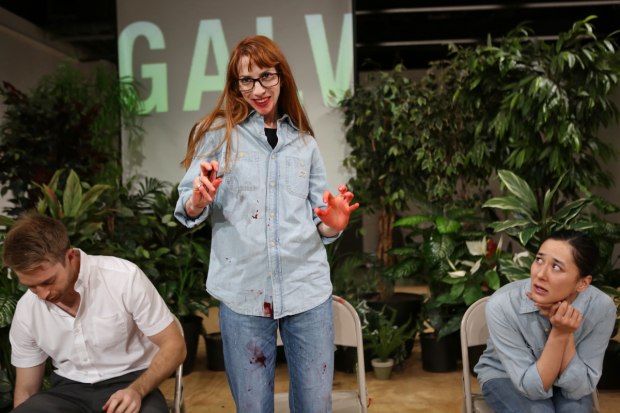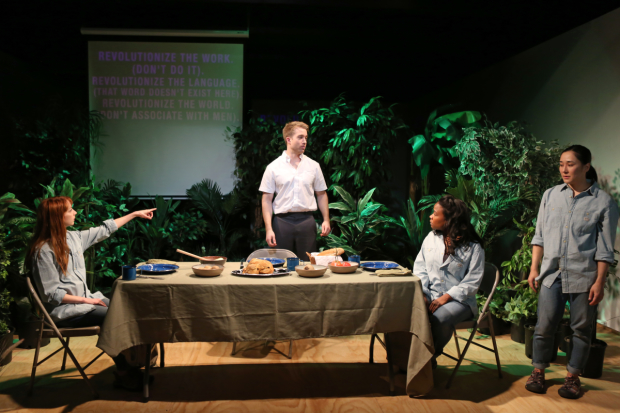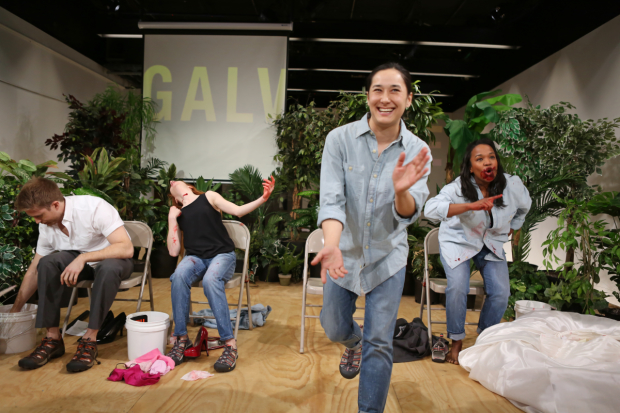Revolt. She Said. Revolt Again.

(© Julieta Cervantes)
"Most importantly, this play should not be well behaved," reads a stage direction on the first page of Alice Birch's Revolt. She Said. Revolt Again. at Soho Rep. In mounting the New York debut of this "in-yer-face" call for revolution, director Lileana Blain-Cruz seems to have taken this primary directive to heart, staging a caffeinated and confrontational production. Unfortunately, the results are unlikely to send anyone onto Walker Street waving a red and black flag.
The show is a series of vignettes with titles like "Revolutionize the Language. (Invert It)." and "Revolutionize the World. (Do Not Marry)." projected over the stage. Three women (Jennifer Ikeda, Eboni Booth, and Molly Bernard) and one man (Daniel Abeles) perform various uncomfortable scenarios: A woman is interrogated by two supermarket managers after she sits with her dress over her head on a pile of melons in the produce aisle; two lovers negotiate sex; three generations of women have an awkward family reunion. Each of these short scenes seems designed to challenge our notions of what is appropriate and acceptable in Western society.

(© Julieta Cervantes)
At one point, two women sit at a dinner table and cut out their tongues under the projected words, "Revolutionize the Body (Start to Shut It Down)." They plop the severed organs on their plates and stare accusatorily at the audience (impressively realistic work by props designers George Hoffmann and Greg Kozatek). With its shocking tableaux, pithy false epiphanies, and pulsating scene transitions, Revolt feels like an extended version of that Saturday Night Live sketch about the theater troupe of socially conscious teens.
In truth, Birch's writing is a lot funnier than anything you'll hear on SNL. The first two scenes are a showcase of the obnoxious tendency to dissect language, searching for a nefarious meaning that was never intended. "You essentially said you wanted to reduce your income tax," says Jennifer Ikeda's character after her male partner proposes marriage, "that I am to become your possession, your property, a thing you own." Ikeda convincingly embodies a happy warrior, gleefully destroying those lesser individuals who do not possess a master's degree in radical HERmenautics. Opposite her, Abeles bugs out his eyes and suppresses an exasperated sigh. He holds his own as the only man in a play that includes the line, "We'll eradicate all men." Tellingly, we never actually get to hear what his marriage proposal sounded like to judge for ourselves.
All of the performers do a fine job with this difficult work. Bernard is very funny, especially as a tightly wound human-resources zombie. Playing opposite her, Booth is polite and insistent (and just a little too perfect) as an employee requesting Mondays off so she can get more sleep (we know whose side the author is on). The four come together for a fugue-like finale seemingly inspired by Sarah Kane's 4:48 Psychosis: Drawing on their bodies with lipstick, they unleash a torrent of chair-tossing insecurity and mildly amusing wordplay. Revolt is an orgy of revolutionary thought, full of sound and fury, signifying nothing.

(© Julieta Cervantes)
The design team masterfully extends the emptily abrasive tone of the text to their work. Set designer Adam Rigg places the action on a raised platform between the audience and the front door, preventing us from escape. A series of bright flashes ends in total darkness (aggressive lighting by Yi Zhao). The floor rumbles with bass (unsettling sound by Palmer Hefferan). We worry, momentarily, that we may actually be punched in the face. But then we remember that this is the theater, where we are always safe even when we are pretending not to be.
Certainly, Revolt will delight many viewers for many different reasons. Gaining a better understanding of the possibilities of the world (and the word) is not one of those reasons.











